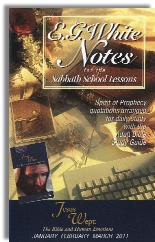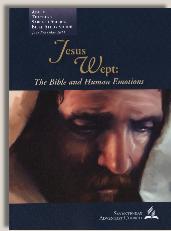|
||||||||||||||
Commentary on "Stress""
Day 6: Thursday, January 13, 2011 - Bringing Relief to Others
Overview
Today's lesson is about bringing relief to others as an antidote to self-centered stress. It begins with a references to Acts 10:38 in which Peter describes Jesus, having been anointed with the Holy Spirit and filled with power, going about "doing good and healing all who were oppressed by the devil." It further makes the point that doing things for others is an excellent way to remove personal pressure from one's life, citing studies showing people who do charitable and volunteer work report greater well-being and satisfaction.
It ends with the story of John D. Rockefeller turning his life around from being near death and suffering from a nervous breakdown by becoming a philanthropist and giving away the majority of his multimillion dollar fortune. The lesson ends with the challenge to make a more concerted, prayerful effort "to do more".
Observations
First of all, the text in Acts 10 is actually yanked out of context. Peter's description of Jesus doing good and healing those oppressed by the devil was in the middle of his sermon to Cornelius and his household. Peter was not using this description to give anyone an example of how to live. In fact, the end result of this sermon of Peter's was that Cornelius an his entire household were convicted by Peter's next sentences, that Jesus was crucified and raised to life on the third day, and they all placed their faith in Him and were filled with the Holy Spirit. The first Gentiles became part of the new church that the Lord Jesus was forming!
Second, the texts inserted for reading into the middle of the lesson—Galatians 6:2, Philippians 2:4, and John 15:13, are also taken out of context.
Galatians 6:2: Bear one another's burdens, and thereby fulfill the law of Christ.
Philippians 2:4: …do not merely look out for your own personal interests, but also for the interests of others.
John 15:13: "Greater love has no one than this, that one lay down his life for his friends."
These passages are not given as directives for living less stressful, more fulfilled lives. In fact, these passages are not directives for anyone who is not born again. Looking out for the welfare of others will not bring anyone true peace, happiness, or satisfaction apart from being born again.
Paul's admonitions in Galatians and Philippians were written to people who were already believers, made alive by the Spirit as a consequence of submitting to the Lord Jesus and accepting His blood as the once-for-all sacrifice for their personal sin. Only as believers who are born from above do our good works actually "count" for eternity. Unbelievers who do good works may ease the circumstances of others and make life less difficult for some, but those good works do not earn the philanthropist any "credit" whatsoever with God.
In Philippians 3:1-11 Paul explains his former life and shows how his new life in Christ changed everything. He states clearly that as far as the Law was concerned, he "was blameless" as a zealous Jew. In fact, he says, "…as to the righteousness which is in the Law, found blameless." In other words, Paul was doing good deeds according to the Torah. When he refers to the "righteousness which is in the law," he is talking about the commands for living found throughout the entire Torah, not merely the 10 Commandments. Paul was a good person, and he did the good required by the Old Testament law.
His good works, however, had absolutely no value, he tells us in verses 7-8. When he met the Lord Jesus and submitted to Him, receiving Him as his Lord and Savior, he realized all those good deeds were as worthwhile as rubbish. He counted all of them as loss for the sake of Christ. Natural humans can do "good deeds". They can be altruistic, philanthropic, and do all manner of community and religious service. But those deeds do nothing to change their hearts or to make an eternal difference to other people.
The example in the lesson of John D. Rockefeller is most interesting, betraying the fact that the lesson's author and editor do not understand the difference between good deeds done in the flesh and good deeds done by the Spirit.
The antidote to "stress" is not doing good for others, although good deeds may give a person some relief from constant worry about one's own circumstances. The true antidote to stress is to live for the Lord Jesus. We cannot live for the Lord Jesus by deciding to "do good". We can only live for Him by submitting our hearts and minds to Him and receiving His forgiveness in His blood. When we place our faith in the reality of His death for our inherent and intractable sin, then we are sealed with the Holy Spirit (Eph. 1:13-14).
Only when we have thus been born again will we be able to work for the Lord Jesus. Only when we are born again do we begin to understand Ephesians 2:10, that "we are God's workmanship, created in Christ Jesus for good wires, which God prepared beforehand so that we would walk in them."
Living for the Lord Jesus means giving up our ideas of how we think we will serve the Lord and surrendering our dreams and desires to Him. It means asking Him to show us the work He created for us to do, and laying aside our expectations and submitting to learning and knowing His will for us. The Lord Jesus does bring us His work to do—and very often that work does not resemble anything we prepared or planned to do. He equips us and opens the doors to His plans for us.
The example of John D. Rockefeller really has no bearing on a biblical study on living with purpose. There is no clear evidence that he was a believer, born of the Spirit. He philanthropy was clearly a more productive and "healthy" choice than his focus on making and investing money, but it still was not a demonstration of a man serving the Lord.
Our calling is not to work for others; our calling is to serve the Lord Jesus. Jesus' life wasn't about helping people. Over and over He stated that He did nothing except what the Father told Him to do. In other words, Jesus did not listen to the people and serve their needs. He listened to the Father, and His service was obedience to the Father—an obedience which resulted in people's receiving the physical and spiritual healing they truly needed.
How to obey God
If anyone reading this commentary is not born again, surrendered to the Lord Jesus and forgiven by His blood, no amount of good works will fix your life. Your obedience to God at this point would be to bow in repentance before Jesus and admit that you are a hopeless sinner, that you need a Savior. Your obedience would be to accept His blood shed on your behalf and to acknowledge Him as your Lord as well as your Savior.
When you do this, you will receive His Spirit, and you will be a completely new person. From this point on your life will be able to "count" for eternal purposes. From this point on you will be able to obey the Lord Jesus and find that He, through your availability, will touch other's lives with healing and hope as you mediate the truth of Scripture and the love of the Father.
Conclusion
- Serving others is not the antidote to stress.
- Jesus' service for others was not "other-focussed". Always, His "service" was in obedience to the Father, not a response to people's stated needs.
- We cannot serve others, regard them as better than ourselves, or lay our lives down for a friend unless we are born again, The biblical admonitions to think of other's better than ourselves are not given to humanity in general. These commands are for those who are already born again and filled with the life of Jesus.
- Again, stress will never "go away". Self-destructive anxiety, however, can melt away—but only as we submit to the One who bled and died for us and who lives again to give us His life.
- Our calling is to live for the Lord Jesus, not to live for others. He Himself removes our anxiety and fear and gives us deep peace—peace that never goes away!
Copyright 2011 BibleStudiesForAdventists.com. All rights reserved. Revised January 11, 2011. This website is published by Life Assurance Ministries, Glendale, Arizona, USA, the publisher of Proclamation! Magazine. Contact email: BibleStudiesForAdventists@gmail.com.
The Sabbath School Bible Study Guide and the corresponding E.G. White Notes are published by Pacific Press Publishing Association, which is owned and operated by the Seventh-day Adventist church. The current quarter's editions are pictured above.
Official Adventist Resources
Standard Edition Study Guide Week 3
Teacher's Edition Study Guide Week 3


